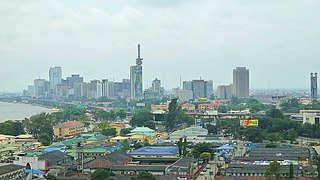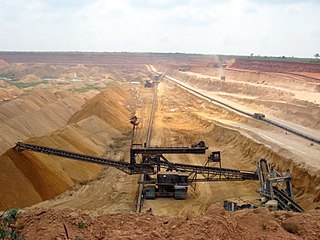
The economy of Eritrea has experienced considerable growth in recent years, indicated by an improvement in gross domestic product (GDP) in October 2012 of 7.5 percent over 2011. However, worker remittances from abroad are estimated to account for 32 percent of gross domestic product. Eritrea has an extensive amount of resources such as copper, gold, granite, marble, and potash. The Eritrean economy has undergone extreme changes due to the War of Independence.

The economy of Ghana has a diverse and rich resource base, including the manufacturing and exportation of digital technology goods, automotive and ship construction and exportation, and the exportation of diverse and rich resources such as hydrocarbons and industrial minerals. These have given Ghana one of the highest GDP per capita in West Africa. Owing to a GDP rebasement, in 2011 Ghana became the fastest-growing economy in the world.

The economy of Mali is based to a large extent upon agriculture, with a mostly rural population engaged in subsistence agriculture.

The economy of Morocco is considered a relatively liberal economy, governed by the law of supply and demand. Since 1993, Morocco has followed a policy of privatization of certain economic sectors which used to be in the hands of the government. Morocco has become a major player in African economic affairs, and is the 5th largest African economy by GDP (PPP). The World Economic Forum placed Morocco as the 1st most competitive economy in North Africa, in its African Competitiveness Report 2014–2015.

The economy of Niger is based largely on internal markets, subsistence agriculture, and the export of raw commodities: foodstuffs to neighbors and raw minerals to world markets. Niger, a landlocked West African nation that straddles the Sahel, has consistently been ranked on the bottom of the Human Development Index, with a relatively low GDP and per capita income, and ranks among the least developed and most heavily indebted countries in the world, despite having large raw commodities and a relatively stable government and society not currently affected by civil war or terrorism. Economic activity centers on subsistence agriculture, animal husbandry, re-export trade, and export of uranium.

The economy of Nigeria is a middle-income, mixed economy and emerging market, with expanding manufacturing, financial, service, communications, technology, and entertainment sectors. It is ranked as the 27th-largest economy in the world in terms of nominal GDP, and the 24th-largest in terms of purchasing power parity. Nigeria has the largest economy in Africa. The country's re-emergent manufacturing sector became the largest on the continent in 2013, and it produces a large proportion of goods and services for the region of West Africa. In addition, the debt-to-GDP ratio was 16.075% as of 2019.

The economy of Togo has struggled greatly. The International Monetary Fund (IMF) ranks it as the tenth poorest country in the world, with development undercut by political instability, lowered commodity prices, and external debts. While industry and services play a role, the economy is dependent on subsistence agriculture, with industrialization and regional banking suffering major setbacks.

Potash includes various mined and manufactured salts that contain potassium in water-soluble form. The name derives from pot ash, which refers to plant ashes or wood ash soaked in water in a pot, the primary means of manufacturing the product before the Industrial Era. The word potassium is derived from potash.

Import substitution industrialization (ISI) is a trade and economic policy that advocates replacing foreign imports with domestic production. It is based on the premise that a country should attempt to reduce its foreign dependency through the local production of industrialized products. The term primarily refers to 20th-century development economics policies, but it has been advocated since the 18th century by economists such as Friedrich List and Alexander Hamilton.

Agriculture in Nigeria is a branch of the economy in Nigeria, providing employment for about 35% of the population as of 2020. As reported by the FAO, agriculture remains the foundation of the Nigerian economy, despite the presence of oil in the country. It is the main source of livelihood for most Nigerians. The Agricultural sector is made up of four sub-sectors: Crop Production, Livestock, Forestry and Fishing.

Agriculture in Ghana consists of a variety of agricultural products and is an established economic sector, providing employment on a formal and informal basis. Ghana produces a variety of crops in various climatic zones which range from dry savanna to wet forest which run in east–west bands across Ghana. Agricultural crops, including yams, grains, cocoa, oil palms, kola nuts, and timber, form the base of agriculture in Ghana's economy. In 2013 agriculture employed 53.6% of the total labor force in Ghana.
Industry in Ghana accounts for about 24.5% of total GDP. However, Ghana's industrial production is rising at a 7.8% rate, giving it the 38th fastest growing industrial production in the world due to government industrialization policies.

Ghana generates electric power from hydropower, fossil-fuel, and renewable energy sources. Electricity generation is one of the key factors in order to achieve the development of the Ghanaian national economy, with aggressive and rapid industrialisation; Ghana's national electric energy consumption was 265 kilowatt hours per capita in 2009.

The economy of Ivory Coast is stable and currently growing, in the aftermath of political instability in recent decades. The Ivory Coast's economy is largely market-based and depends heavily on the agricultural sector. Almost 70% of the Ivorian people are engaged in some form of agricultural activity. GDP per capita grew 82% in the 1960s, reaching a peak growth of 360% in the 1970s, but this proved unsustainable and it shrank by 28% in the 1980s and a further 22% in the 1990s. This decline, coupled with high population growth, resulted in a steady fall in living standards. The Gross national product per capita, now rising again, was about US$727 in 1996. It was substantially higher two decades before.
Pakistan's industrial sector accounts for 28.11% of the GDP. Of this, manufacturing makes up 12.52%, mining constitutes 2.18%, construction makes up 2.05%, and electricity and gas 1.36%. The majority of industry is made up of textile units, with textiles contributing $15.4b to exports, making up 56% of total exports. Other units include surgical instruments, chemicals, and a budding automotive industry.
Benin is a coastal country located in the Gulf of Guinea in Western Africa, which is a resource rich region. Energy in Benin has a diverse energy mix and takes several forms including: solar, wind, hydropower, biomass, fossil resources, and mineral resources. Out of this energy mix, about 60% of energy comes from biomass. Benin is also dependent on energy imports from Ghana and Côte d'Ivoire. While power plants and other energy facilities were built in the 1950s and 1960s, the lack of investment has led to deterioration over time. Similarly, its location in the oil-rich Gulf of Guinea has led to an attempt of oil production starting in the late 1980s. However, due to unprofitable operations, oil production halted in 1998.

Agbogbloshie is a nickname of a commercial district on the Korle Lagoon of the Odaw River, near the center of Accra, Ghana's capital city in the Greater Accra region. Near the slum called "Old Fadama", the Agbogbloshie site became known as a destination for externally generated automobile and electronic scrap collected from mostly the western world. It was alleged to be at the center of a legal and illegal exportation network for the environmental dumping of electronic waste (e-waste) from industrialized nations. The Basel Action Network, a small NGO based in Seattle, has referred to Agbogbloshie as a "digital dumping ground", where they allege millions of tons of e-waste are processed each year.

The economy of the Western Cape in South Africa is dominated by the city of Cape Town, which accounts for 72% of the Western Cape's economic activity in 2016. The single largest contributor to the region's economy is the financial and business services sector, followed by manufacturing. Close to 30% of the gross regional product comes from foreign trade with agricultural products and wine dominating exports. High-tech industries, international call centres, fashion design, advertising and TV production are niche industries rapidly gaining in importance.
Cocoa production is important to the economy of Nigeria. Cocoa is the leading agricultural export of the country and Nigeria is currently the world's fourth largest producer of cocoa, after Ivory Coast, Indonesia and Ghana, and the third largest exporter, after Ivory Coast and Ghana. The crop was a major foreign exchange earner for Nigeria in the 1950s and 1960s and in 1970 the country was the second largest producer in the world but following investments in the oil sector in the 1970s and 1980s, Nigeria's share of world output declined. In 2010, cocoa production accounted for only 0.3% of agricultural GDP. Average cocoa beans production in Nigeria between 2000 and 2010 was 389,272 tonnes per year rising from 170,000 tonnes produced in 1999.

Economic history of Ghana details the economic situation of Ghana since pre-colonial times to date.
















